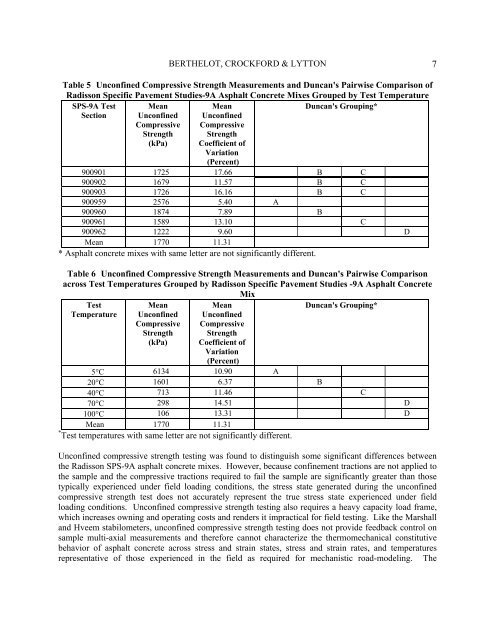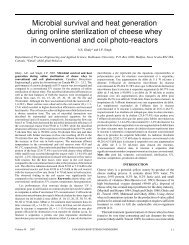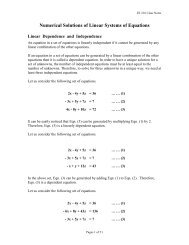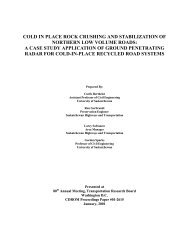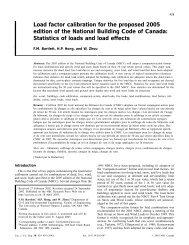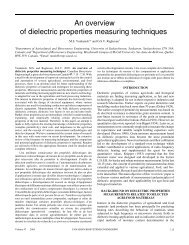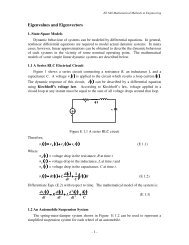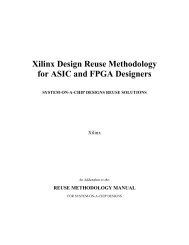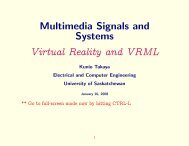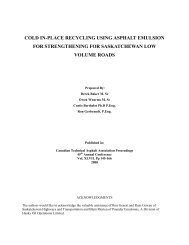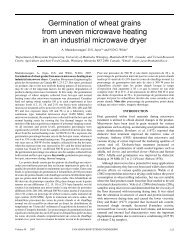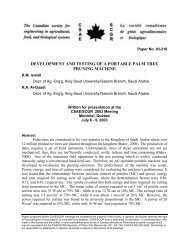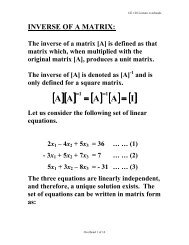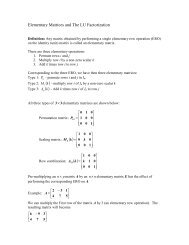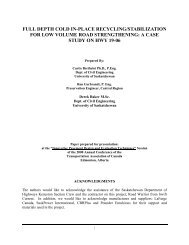comparison of alternative asphalt concrete rut characterization
comparison of alternative asphalt concrete rut characterization
comparison of alternative asphalt concrete rut characterization
Create successful ePaper yourself
Turn your PDF publications into a flip-book with our unique Google optimized e-Paper software.
BERTHELOT, CROCKFORD & LYTTON 7Table 5 Unconfined Compressive Strength Measurements and Duncan's Pairwise Comparison <strong>of</strong>Radisson Specific Pavement Studies-9A Asphalt Concrete Mixes Grouped by Test TemperatureSPS-9A TestDuncan's Grouping*SectionMeanUnconfinedCompressiveStrength(kPa)MeanUnconfinedCompressiveStrengthCoefficient <strong>of</strong>Variation(Percent)900901 1725 17.66 B C900902 1679 11.57 B C900903 1726 16.16 B C900959 2576 5.40 A900960 1874 7.89 B900961 1589 13.10 C900962 1222 9.60 DMean 1770 11.31* Asphalt <strong>concrete</strong> mixes with same letter are not significantly different.Table 6 Unconfined Compressive Strength Measurements and Duncan's Pairwise Comparisonacross Test Temperatures Grouped by Radisson Specific Pavement Studies -9A Asphalt ConcreteMixTestTemperatureMeanUnconfinedCompressiveStrength(kPa)MeanUnconfinedCompressiveStrengthCoefficient <strong>of</strong>Variation(Percent)Duncan's Grouping*5°C 6134 10.90 A20°C 1601 6.37 B40°C 713 11.46 C70°C 298 14.51 D100°C 106 13.31 DMean 1770 11.31* Test temperatures with same letter are not significantly different.Unconfined compressive strength testing was found to distinguish some significant differences betweenthe Radisson SPS-9A <strong>asphalt</strong> <strong>concrete</strong> mixes. However, because confinement tractions are not applied tothe sample and the compressive tractions required to fail the sample are significantly greater than thosetypically experienced under field loading conditions, the stress state generated during the unconfinedcompressive strength test does not accurately represent the true stress state experienced under fieldloading conditions. Unconfined compressive strength testing also requires a heavy capacity load frame,which increases owning and operating costs and renders it impractical for field testing. Like the Marshalland Hveem stabilometers, unconfined compressive strength testing does not provide feedback control onsample multi-axial measurements and therefore cannot characterize the thermomechanical constitutivebehavior <strong>of</strong> <strong>asphalt</strong> <strong>concrete</strong> across stress and strain states, stress and strain rates, and temperaturesrepresentative <strong>of</strong> those experienced in the field as required for mechanistic road-modeling. The


